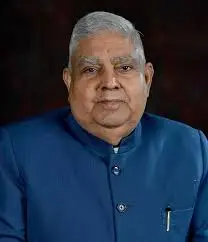Vice-President Jagdeep Dhankar has questioned the probe conducted by the three-judge in-house committee into the alleged recovery of unaccounted cash from the official residence of Justice Yashwant Varma.
Speaking at the launch of the book titled ‘The Constitution We Adopted,’ edited by Senior Advocate Vijay Hansaria on Monday, Dhankar said the committee lacked any legal sanctity to conduct the investigation.
The Vice-President further said that the incident took place on March 14 and for a week, the country of 1.4 billion people did not know about it. Just imagine how many such instances may have taken place. Every such instance impacted the common man.
The country was still waiting to know the truth behind the money trail, its purpose and the bigger sharks, he added.
Following the alleged recovery of unaccounted cash from Justice Varma’s official residence in Delhi during a firefighting operation on March 14, former CJI Sanjiv Khanna had constituted a three-member committee on March 22 to initiate an in-house probe against the former Delhi High Court judge.
The panel comprised Punjab and Haryana High Court Chief Justice Sheel Nagu, Himachal Pradesh High Court Chief Justice GS Sandhawalia and Karnataka High Court judge Justice Anu Sivaraman. It started investigations on March 25 and submitted its report to the CJI on May 3.
Speaking about the in-house panel, Dhankhar said this resulted in additional burden on Chief Justices of two High Courts.
The Chief Justice of the Punjab and Haryana High Court, which had jurisdiction over two states and a Union Territory, was involved in an ‘inconsequential’ inquiry that had no constitutional premise, he pointed out.
Noting that the inquiry report may be sent to anyone by a mechanism evolved by the court on the administrative side, Dhankhar said people did not know whether this inquiry committee recovered any electronic evidence.
Praising former Chief Justice of India (CJI) Sanjiv Khanna for putting the initial report in the case in the public domain, the Vice-President said it restored some confidence.
Following his indictment by the in-house panel, former CJI Khanna had asked Justice Varma to either tender his resignation or face impeachment proceedings.
Since Justice Varma refused to resign, former CJI Khanna forwarded the in-house committee report, along with Justice Varma’s response, to the President of India and the Prime Minister for further action.
Dhankhar stressed on the need to revisit the Supreme Court verdict of 1991 in the case of K Veeraswami v. Union of India, which established the mechanism for the in-house probe,
He said the verdict provided an impregnable cover and immunity to the judges, which, in Justice Varma’s case, handicapped both the Supreme Court and the executive.
A scaffolding of impunity had risen, neutralising all salvos of accountability and transparency. Now is the time to change it, he added.
The incident of Justice Varma was a concrete manifestation of what ailed the system, with several reputations becoming fragile.m, said the Vice-President, adding that only a thorough and scientific probe could lay to rest this controversy. The system would get a makeover once the culprits were brought to justice, he noted.


